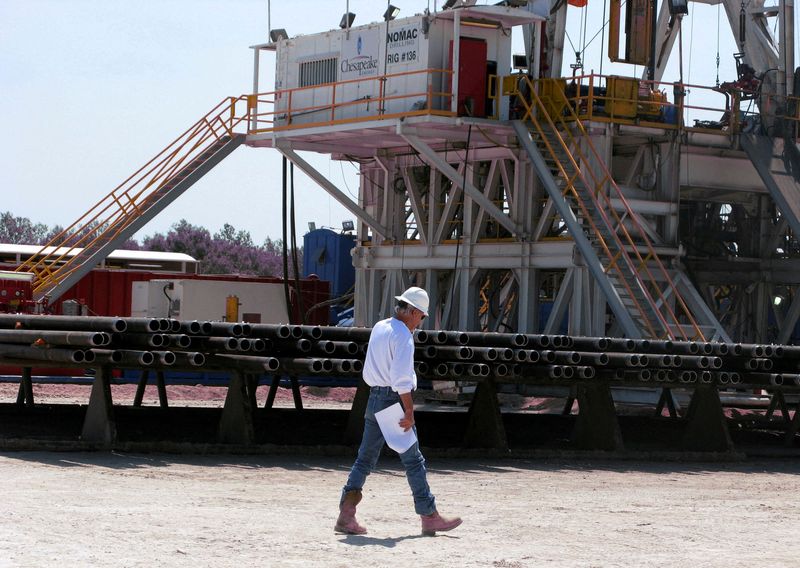By Arathy Somasekhar
HOUSTON (Reuters) - A rout in natural gas prices will hurt first-quarter earnings and cash flows at gas producers as hedges - the industry's version of price insurance - were inadequate to offset the expected losses, analysts and industry experts said.
Producers starting the year with fewer hedges than historically will have to sell more gas at the market rate of about $2.45 per million British thermal units (mmBtu), below the breakeven prices for producing gas in some regions, and that may force some companies to reduce drilling and put off completing wells.
Hedges, or contracts that lock in prices for future output, help producers protect cash flows against price swings, helping them drill and complete wells - crucial at a time when Europe has looked to the United States for gas.
U.S. prices for the heating fuel traded as low as $2.34 per mmBtu this month, down 76% from last year's August peak and the lowest level since April 2021, on mild winter weather in North America and on weaker exports.
The low levels of hedging would drain cash flow as market selling prices are low, said Matt Hagerty, senior energy strategist at FactSet's BTU Analytics.
About 36% of 2023 gas production was hedged at the end of September, according to consultancy Energy Aspects, which tracked 40 publicly traded gas producers. That percentage was down from 52% a year earlier.
Producers entered in to only two to three swap deals per month from April to October last year, said David Seduski, natural gas analyst at Energy Aspects, referring to a type of hedge. He called that amount "incredibly minimal" and said it compared with 30 to 50 such trades per month in 2021.
A rally in prices in 2022 after Russia's invasion of Ukraine forced a lot of producers already hedged at lower prices to take on hedging losses. That may have encouraged them to hedge less.
"Last year was pretty jarring for folks, who weren't ready for the uptick in price. A lot of folks probably sold off those hedges and wanted to be exposed to the upside and might see themselves in the predicament they're in now," said Trisha Curtis, chief executive of energy consultancy PetroNerds added.
EQT Corp (NYSE:EQT), the top U.S. producer of natural gas, last month said it expects a $4.6 billion loss on derivatives for 2022, and net cash settlements of $5.9 billion. No. 2 producer Southwestern Energy Co posted a $6.71 billion loss on derivatives for the first nine months of 2022.
RISKY STRATEGIES
Some companies have let their hedges expire, increasing exposure to current prices. Antero Resources Corp said in October that the vast majority of its hedges would roll off by Jan 1.
Another type of hedge, known as a three-way collar, could backfire because of the extent of the fall in prices, analysts said. These transactions have a producer buy an agreement to sell natural gas at one price, called a put, while also selling a put at a lower price in hopes of pocketing the premium from its buyer.
Effectively, this is a calculated bet that gas will fall to a certain level and no further. But when it falls below the predicted lower price, it takes away some of the benefits of the hedge.
Chesapeake Energy Corp (NYSE:CHK), for example, bought puts for 900 million cubic feet at $3.40 per million cubic feet (mmcf), while also selling puts for $2.50 mmcf for the first quarter, according to a November presentation.
Were gas prices to average $2.36 per mmcf, the company would pay out 14 cents per mmcf, reducing the gains from the hedge.
Antero and Chesapeake did not respond to a request for a comment.
Denver-based Ovintiv Inc, previously Encana, also said it had sold puts for 400 mmcfpd at $2.75 per mmcf for the first quarter of 2023, according to a November press release. That would erode the gains from the hedges by about 39 cents per mmcf.
On the other hand, companies that locked in higher prices on average during the run-up in prices late last year could see gains, Rystad Energy senior analyst Matthew Bernstein said.

While overall hedging was lower, the average $3.16 per mmBtu was higher than a year earlier, he added. EQT, for example, has hedged about 58% of its total production at an average of about $3.40 per mmBtu, higher than current market prices.
Ovintiv and EQT did not immediately respond to a request for a comment.